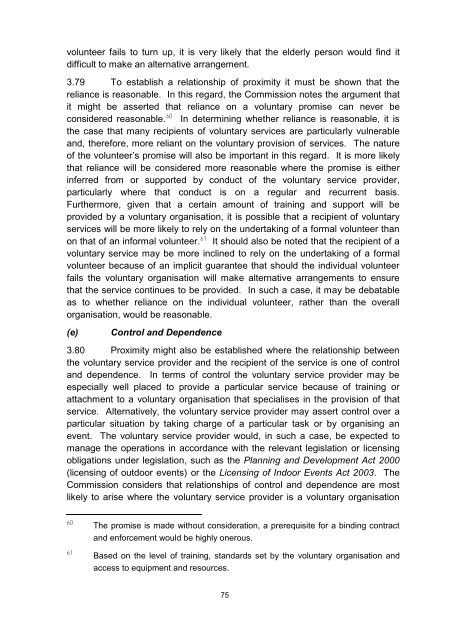civil liability of good samaritans and volunteers - Law Reform ...
civil liability of good samaritans and volunteers - Law Reform ...
civil liability of good samaritans and volunteers - Law Reform ...
Create successful ePaper yourself
Turn your PDF publications into a flip-book with our unique Google optimized e-Paper software.
volunteer fails to turn up, it is very likely that the elderly person would find itdifficult to make an alternative arrangement.3.79 To establish a relationship <strong>of</strong> proximity it must be shown that thereliance is reasonable. In this regard, the Commission notes the argument thatit might be asserted that reliance on a voluntary promise can never beconsidered reasonable. 60 In determining whether reliance is reasonable, it isthe case that many recipients <strong>of</strong> voluntary services are particularly vulnerable<strong>and</strong>, therefore, more reliant on the voluntary provision <strong>of</strong> services. The nature<strong>of</strong> the volunteer‟s promise will also be important in this regard. It is more likelythat reliance will be considered more reasonable where the promise is eitherinferred from or supported by conduct <strong>of</strong> the voluntary service provider,particularly where that conduct is on a regular <strong>and</strong> recurrent basis.Furthermore, given that a certain amount <strong>of</strong> training <strong>and</strong> support will beprovided by a voluntary organisation, it is possible that a recipient <strong>of</strong> voluntaryservices will be more likely to rely on the undertaking <strong>of</strong> a formal volunteer thanon that <strong>of</strong> an informal volunteer. 61 It should also be noted that the recipient <strong>of</strong> avoluntary service may be more inclined to rely on the undertaking <strong>of</strong> a formalvolunteer because <strong>of</strong> an implicit guarantee that should the individual volunteerfails the voluntary organisation will make alternative arrangements to ensurethat the service continues to be provided. In such a case, it may be debatableas to whether reliance on the individual volunteer, rather than the overallorganisation, would be reasonable.(e)Control <strong>and</strong> Dependence3.80 Proximity might also be established where the relationship betweenthe voluntary service provider <strong>and</strong> the recipient <strong>of</strong> the service is one <strong>of</strong> control<strong>and</strong> dependence. In terms <strong>of</strong> control the voluntary service provider may beespecially well placed to provide a particular service because <strong>of</strong> training orattachment to a voluntary organisation that specialises in the provision <strong>of</strong> thatservice. Alternatively, the voluntary service provider may assert control over aparticular situation by taking charge <strong>of</strong> a particular task or by organising anevent. The voluntary service provider would, in such a case, be expected tomanage the operations in accordance with the relevant legislation or licensingobligations under legislation, such as the Planning <strong>and</strong> Development Act 2000(licensing <strong>of</strong> outdoor events) or the Licensing <strong>of</strong> Indoor Events Act 2003. TheCommission considers that relationships <strong>of</strong> control <strong>and</strong> dependence are mostlikely to arise where the voluntary service provider is a voluntary organisation6061The promise is made without consideration, a prerequisite for a binding contract<strong>and</strong> enforcement would be highly onerous.Based on the level <strong>of</strong> training, st<strong>and</strong>ards set by the voluntary organisation <strong>and</strong>access to equipment <strong>and</strong> resources.75
















